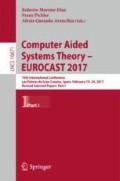Abstract
Some recent discussions [1,2,3,4,5] have suggested that the concept of universal stored program computer is not useful in understanding the history of computing. In particular, there is the suggestion that this idea was so well known that all of the early computing devices already incorporated this concept. Here, we argue that all or almost all of the early digital machines were based on the idea of a calculator and that the computer was a real and significant new concept. We attempt to explain the differences between calculator and computer, and try to show that our contemporary computing is based on the computer rather than the calculator, and that the calculator model is inadequate to describe our current notions of computing.
Access this chapter
Tax calculation will be finalised at checkout
Purchases are for personal use only
References
Vardi, M.: Who begat computing? Commun. ACM 56, 5 (2013)
Copeland, J., Dresner, E., Proudfoot, D., Shagrir, O.: Time to reinspect the foundations? Commun. ACM 59, 34–38 (2016)
Haigh, T.: Actually, Turing did not invent the computer. Commun. ACM 57, 36–41 (2014)
Haugh, T., Priestly, M., Rope, C.: ENIAC in Action: Making and Remaking the Modern Computer. MIT Press, Cambridge (2016)
Sommaruga, G., Strahm, T. (eds.): Turing’s Revolution. Springer, Cham (2015). https://doi.org/10.1007/978-3-319-22156-4
Swade, D.: The Difference Engine: Charles Babbage and the Quest to Build the First Computer. Viking, New York (2001)
Stern, N.B.: From ENIAC to UNIVAC: Appraisal of the Eckert-Mauchly Computers. Digital Press, Bedford (1981)
Goldstine, H.H.: The Computer from Pascal to von Neumann. Princeton University Press, Princeton (1980)
Davis, M.: The Universal Computer: The Road from Leibniz to Turing. W.W. Norton, New York (2000)
Padua, S.: The Thrilling Adventures of Lovelace and Babbage. Pantheon, New York (2015)
Turing, A.M.: On computable numbers, with an application to the entscheidungsproblem. Proc. London Math. Soc. 42, 230–265 (1936)
Matiyasevich, Y.: Hilbert’s Tenth Problem. MIT Press, Cambridge (1993)
Minsky, M.: Computation: Finite and Infinite Machines. Prentice-Hall, Englewood Cliffs (1967)
Cull, P.: Notes for CS 321. Computer Science, Oregon State University, Corvallis (2016)
von Neumann, J.: First Draft of a Report on the EDVAC. University of Pennsylvania, Philadelphia (1945)
Link, D.: Archaeology of Algorithmic Artefacts. Univocal, Minneapolis (2016)
Copeland, B.J., et al.: Colossus: The Secrets of Bletchley Park’s Code-Breaking Computers. Oxford University Press, Oxford (2010)
Burks, A.R., Burks, A.W.: The First Electronic Computer: The Atanasoff Story. University of Michigan Press, Ann Arbor (1989)
Zuse, K.: The Computer, My Life. Springer, New York (1993). https://doi.org/10.1007/978-3-662-02931-2
Copeland, B.J., et al.: Alan Turing’s Electronic Brain. Oxford University Press, Oxford (2005)
Wilkes, W.V., Renwick, W.: The EDSAC (electronic delay storage automatic calculator). Math. Comput. 4, 61–65 (1950)
Dyson, G.: Turing’s Cathedral. Pantheon, New York (2012)
Author information
Authors and Affiliations
Corresponding author
Editor information
Editors and Affiliations
Rights and permissions
Copyright information
© 2018 Springer International Publishing AG
About this paper
Cite this paper
Cull, P. (2018). The Computer and the Calculator. In: Moreno-Díaz, R., Pichler, F., Quesada-Arencibia, A. (eds) Computer Aided Systems Theory – EUROCAST 2017. EUROCAST 2017. Lecture Notes in Computer Science(), vol 10671. Springer, Cham. https://doi.org/10.1007/978-3-319-74718-7_29
Download citation
DOI: https://doi.org/10.1007/978-3-319-74718-7_29
Published:
Publisher Name: Springer, Cham
Print ISBN: 978-3-319-74717-0
Online ISBN: 978-3-319-74718-7
eBook Packages: Computer ScienceComputer Science (R0)

